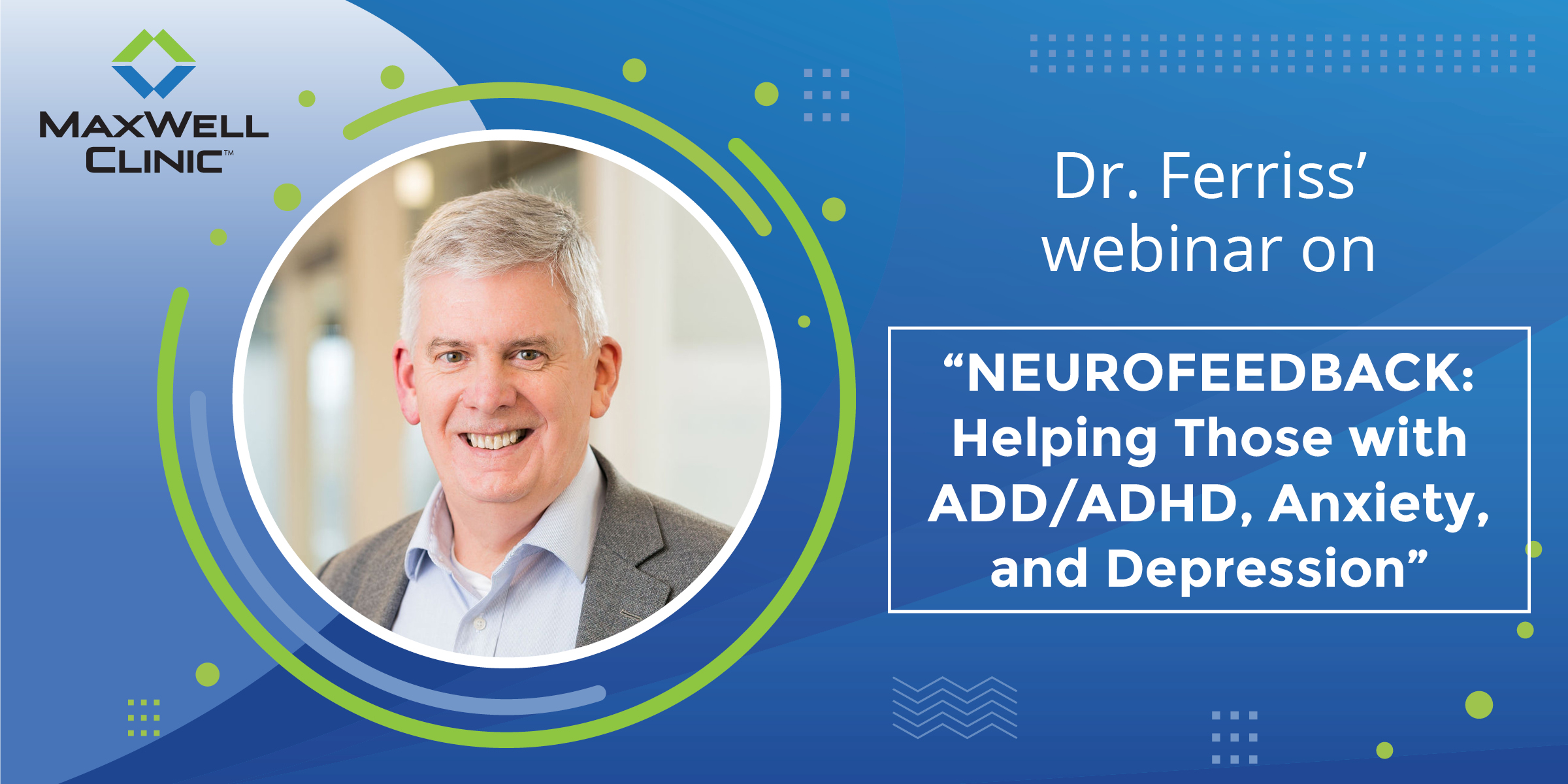
Neurofeedback: Helping Those with ADD/ADHD, Anxiety, and Depression
Are you ready to take charge of your health? Schedule your free 20-minute discovery call with our New Patient Coordinator to see how you can become a patient at MaxWell Clinic and start your healing journey today.
Did you know that you have as many brain cells as there are stars in the Milky Way galaxy? And that all of these cells form a vast network of connections?
It’s really amazing to think about. But what’s even more amazing is that your brain has the ability to form new connections. In essence, this means that your brain can re-learn how it works.
Neurofeedback is a powerful therapy that harnesses this amazing ability of your brain to learn new, more efficient ways of functioning.
It is an extremely safe therapy that has research-proven benefits for people with ADD/ADHD, anxiety, and depression. Neurofeedback works by training the brain to convert unhealthy electrical patterns into healthy electrical patterns – without drugs and without stimulating the brain with an electrical current.
Maxwell Clinic has been offering neurofeedback therapy since 2008 and has had years of successful experience with a large number of patients.
Watch the video to learn more about this powerful therapy:
- Discover what neurofeedback is and how it works to change your brain
- Learn what conditions and symptoms can improve with neurofeedback
- Find out if neurofeedback might be right for you
Your brain has an amazing capacity for change. It’s time to harness this power and start feeling like yourself again.
Understanding Neurofeedback: A Comprehensive Overview
Neurofeedback, an innovative therapeutic approach, has garnered significant attention in recent years. Delving into its intricacies, this blog aims to elucidate the process, its potential benefits, and common queries surrounding it.
Neurofeedback primarily revolves around a biofeedback mechanism based on the analysis of brainwave activity. Individuals grappling with conditions such as generalized anxiety disorder, PTSD, phobias, and panic disorders might find solace in this therapeutic approach. Shockingly, the lifetime prevalence of anxiety-related disorders in Western countries stands between 20 to 30 percent, highlighting the profound need for effective treatments.
Bridging the Treatment Gap
Historically, treatments for these conditions leaned heavily on psychotherapy and medication. While these avenues present undeniable merits, they aren’t universally embraced. Chronic reliance on medications like benzodiazepines, while beneficial in acute scenarios, may not be conducive for long-term management due to potential adverse effects. The pressing need for alternative treatments paved the way for neurofeedback.
A compelling case study underscores the efficacy of neurofeedback. A young male in his early 30s, previously diagnosed with ADHD and more recently plagued by generalized anxiety, underwent 40 sessions of whole brain training neurofeedback. The results? A marked reduction in anxiety and panic, dramatically enhancing his quality of life.
Navigating Neurofeedback Sessions
The duration and frequency of neurofeedback sessions vary based on individual needs. Generally, initiating with at least 20 sessions is advised, with most patients benefiting from around 30 to 40 sessions. A periodic reassessment after every 20 sessions ensures the treatment’s efficacy and guides further therapeutic decisions.
Children, particularly those as young as eight, can also benefit from neurofeedback, especially in cases of ADHD. Tailoring the sessions to be engaging and comfortable for the child, often turning them into “missions” or “games,” ensures a positive therapeutic experience. Furthermore, the consistency of sessions is paramount. Ideally, patients should undergo two to three sessions weekly to observe tangible progress.
From a logistical standpoint, a typical neurofeedback session spans 45 minutes. However, the core neurofeedback activity, the actual training of the brain, lasts approximately 20 to 25 minutes. Any extension beyond this duration may not yield added benefits and could even be counterproductive. Therefore, adherence to these time frames, with due customization based on individual requirements, ensures optimal outcomes.
Concluding Thoughts
The realm of neurofeedback, though relatively nascent, holds immense promise. As awareness grows and more individuals seek non-pharmacological solutions for their mental health concerns, treatments like neurofeedback are likely to gain traction. By offering a tailored, effective, and non-invasive therapeutic avenue, Neurofeedback stands as a beacon of hope for many.
In essence, the potential of neurofeedback to transform lives is undeniable. As more research unfolds and techniques evolve, the horizon for this therapeutic approach seems boundless.
Are you ready to take charge of your health? Schedule your free 20-minute discovery call with our New Patient Coordinator to see how you can become a patient at MaxWell Clinic and start your healing journey today.
This blog provides general information and discussions about health and related subjects. The information and other content provided in this blog, website or in any linked materials are not intended and should not be considered, or used as a substitute for, medical advice, diagnosis or treatment. This blog does not constitute the practice of any medical, nursing or other professional health care advice, diagnosis or treatment. We cannot diagnose conditions, provide second opinions or make specific treatment recommendations through this blog or website.
If you or any other person has a medical concern, you should consult with your health care provider or seek other professional medical treatment immediately. Never disregard professional medical advice or delay in seeking it because of something that you have read on this blog, website or in any linked materials. If you are experiencing a medical emergency, please call 911 or call for emergency medical help on the nearest telephone immediately.
